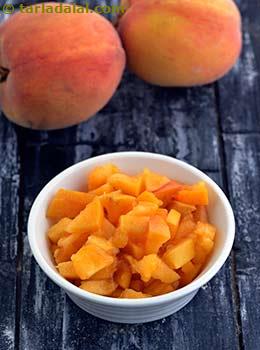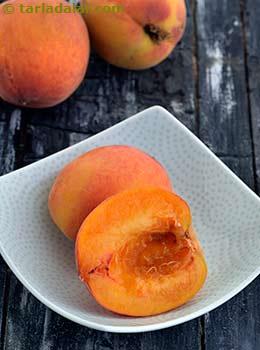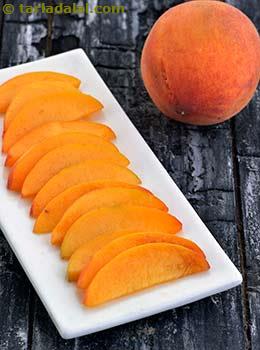peach
What is Peach? Glossary | Benefits, Uses + Recipes |
Viewed 33316 times
Also known asAadoo, SataluWhat is Peach, Aadoo ?
Peaches can be red, pink, yellow, white, or a combination of those colors. On one side of the fruit is a distinctive vertical indentation. Peaches and nectarines look very similar, but they can be told apart by their skin texture: peaches are fuzzy and dull, while nectarines are smooth and shiny.
It is a deciduous tree growing to 5-10 m tall, belonging to the subfamily Prunoideae. The fruit is a drupe, with a single large seed encased in hard wood (called the "stone" or "pit"), yellow or whitish flesh, a delicate aroma, and a skin that is either velvety (peaches) or smooth (nectarines) in different cultivars. The flesh is very delicate and easily bruised in some cultivars, but is fairly firm in some commercial cultivars, especially when green. The seed is red-brown, oval shaped and 1.5-2 cm long. Peaches, along with cherries, plums and apricots, are stone fruits (drupes).
How to Select peaches April to July and sometimes till August are peak season for fresh peaches. Choose peaches that are firm to the touch, but whose flesh will yield with gentle pressure. The fruits should be unblemished and free of bruises, with a warm, fragrant aroma.
Most peaches will have a rosy blush to the skin, but this is usually just a variety trait and not necessarily an indication of quality. A good indicator of maturity is a well-defined cleft in the shape of the peach. Avoid those with any hint of green as they will never fully ripen. Although peaches will continue to ripen after being picked from the tree, the sugar production ceases once plucked and will not increase even though the fruit may soften.
Under ripe peaches can be ripened somewhat by placing them in a paper bag punched with holes at room temperature in a spot away from sunlight.
To remove the seed, slice lengthwise 360 degrees around the pit down to the stone. Twist each half simultaneously in opposite directions. Freestone peaches should separate easily.
Culinary uses of peaches in Indian cooking
Indian desserts using peaches
![]()
1. Rich, milky and fruity too, the Peach Halwa is an Indian dessert that is sure to please the palates of people with varied tastes. The strong scent of fresh peaches sautéed in ghee, together with the lingering aroma of khoya cooked with sugar, and the unmistakable aroma of cardamom, make this halwa a winner. Every aspect of this recipe is carefully designed to entertain, including the luxurious garnish of slivered almonds.
2. Sweetened Peach with Vanilla Ice-Cream is one such dessert , which everybody will fall in love with. Indeed, who can resist a preserve of peach, cooked with sugar and spices, served with luscious vanilla ice-cream. The cinnamon-tinged peach flavour will linger on your taste buds for a long time after the cup is wiped clean.
3. Indian style Peach Crumble is a melt-in-the-mouth dessert with fruity and spicy shades! Cinnamon powder, flour and butter are rubbed between the palms to get a crumbly mixture, which is layered upon canned peaches, topped with raisins, and baked for a while to get a uniquely-textured dessert. Remember that the Peach Crumble tastes best when it is warm.
Indian milkshake, drinks, juice recipes using peaches
1. Together with vanilla ice-cream, these two fruits make a wonderfully creamy and flavourful milkshake that will please everybody. When making the Peach and Mango Milkshake, you can alter the amount of sugar based on the natural sweetness of the fruits.
2, A unique procedure gives this Fresh Peach Fizzy Drink the perfect mix of colour, mouth-feel and flavour. The fresh peach is first cooked with sugar, blended and then aerated with chilled Sprite, giving it a really tingling flavour and rich mouth-feel.
· Add sliced peach to hot or cold cereal.
· The next time you make whole grain pancakes add some chopped peach to the batter.
· Serve fresh peaches in your green salad when they are in season
· Its juicy, sweet, fragrant flesh is a favorite in pies, pastries, and desserts, but creative chefs have found marvelous uses for the peach in a variety of savory dishes.
· Peach pulp or chunks are often topped with vanilla ice cream, and garnished.
· Other popular peach uses include jelly, jam, ice cream, liqueur, and brandy.
· The flesh of peaches will darken with exposure to air, so they must be cooked or eaten immediately once cut or further treated. The darkening can be retarded by dipping the cut pieces in an acidic juice of citrus or pineapple, either diluted with water or full strength.
· For sweet dishes, you may prefer to use pineapple or orange juice as the acid rather than the more tart lemon or lime juice. For savory dishes, lemon or lime is usually the choice.
· Washing peaches will remove most of the fuzz.
· For a simple, yet elegant dessert, try vanilla bean ice cream topped with sliced peaches.
How to StoreSince peaches are highly perishable, purchase only the amount you need to use within a few days or plan on preserving them for long-term storage. The fruit should not be washed until just before you intend to use it. When storing fresh peaches at room temperature, be sure there is enough space between them to allow proper air circulation. Fresh peaches can be kept at room temperature three to four days, depending on how ripe they are when you buy them.
Refrigeration will extend their life, but not by more than a day or two. Peaches need humidity, so refrigerate in a plastic bag and use within two days. Ideally, let refrigerated peaches come close to room temperature before eating (about 30 minutes), as the flavor will be more full and robust.
The seed stone will impart a bitter flavor, so be sure to remove it before canning or freezing peaches. Peaches frozen in a sugar pack result in a better product than those frozen in plain water. Better quality is also served if you peel raw peaches rather than blanching before freezing. If the fruits are overly ripe, puree or chop the fruit, add an acidic juice to keep the fruit from darkening, and freeze in a tightly-sealed container or plastic zip-top bag with air removed.
Health Benefits of peaches Peaches are not very high in calories and a
good source of fibre. Thus they have a good satiety value. You can have them in between meals while on
weight loss regime. The fibre also helps to maintain a healthy digestive tract. Thanks to the low sodium count and high in
potassium, that they are considered
heart friendly and can be included by people with
high blood pressure. One medium peach is a wise addition to a
diabetic diet too. All they need to do is count these carbs as a part of their day’s intake and balance it through the day. Peaches have fair amounts of
vitamin C which along with other phenolic compounds may form a line of defence against various diseases including cancer. Moreover, the vitamin C helps promote skin health.
Chopped peaches

Peaches can be peeled or unpeeled, as desired. Take a sharp knife, slice it from the top to remove the stem and then cut it vertically into half from the centre. Cut the half portion into another half vertically and remove the seed from the centre. Cut each portion into long strips of the desired thickness. Line all the strips together on the chopping board and chop by horizontally by cutting them in small pieces approximately ¼ inch in diameter, although the chopped food doesn't need to be exactly the same size. If the recipe calls for the ingredients to be "roughly chopped," make the pieces slightly larger.
Peach cubes

Take a sharp knife, slice it from the top to remove the stem and then cut it vertically into half from the centre. Cut the half portion into another half vertically and remove the seed from the centre. Cut each portion into thick long strips. Line up the strips with your non-working hand and cut them horizontally into big square pieces. Cube them as per the recipe's need regarding the size of the cubes, (for example, "cut into ½-inch cubes").
Peach halves

Choose ripe, mature fruits of ideal quality. Wash the peaches. Slice the top stem using a sharp knife and make a cut lengthwise to make 2 halves. Remove the seed from the centre. A melon baller or metal measuring spoon is suitable for coring the peach.
Peach puree
.jpg)
To make the peach puree, peel, chop it into halves, remove the seed and cut the fresh peach into medium sized cubes. Combine the peach cubes with sugar in a broad non stick pan and cook until fruit is soft and sugar is just starting to caramelize. Cool slightly and puree in a food processor until smooth. Preserve it in a sterilized bottle in the deep freezer for further use.
Sliced peaches

Take a sharp knife, slice it from the top to remove the stem and then cut it vertically into half from the centre. Cut the half portion into another half vertically and remove the seed from the centre. Slice using a sharp knife by cutting vertically across the cutting board. Slice them thinly or thickly as the recipe requirement, can used as a garnish.